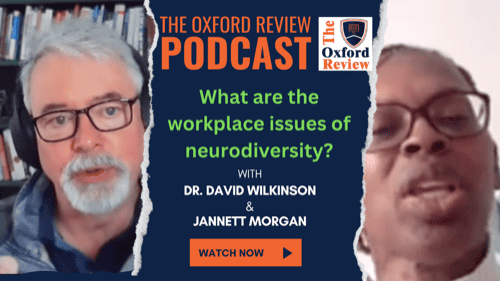Category Archives for "Blog"
The Oxford Review Blog – Articles, posts and research briefings about Organisational Development, Human Resources, Learning & Development, Management, Leadership.
The Oxford Review Blog – Articles, posts and research briefings about Organisational Development, Human Resources, Learning & Development, Management, Leadership.

History of the Balanced Scorecard The Balanced Scorecard was first developed and introduced in 1992 by Professors Robert Kaplan and David Norton from the Harvard Business School. They originally published their work in 1992 in the Harvard Business Review (HBR) and, as far as we can ascertain, have never published their work through a peer […]
Read more
In this podcast, I am joined again by Jannett Morgan who’s a neurodiversity coach consultant, and today what I want to do is start to explore some of the issues in the workplace and how neurodiversity kind of presents itself, how organisations see it and what can kind of happen if something different happens? Listen […]
Read more
Probably almost more than any other position or role within an organisation, salespeople span the boundary between an organisation and the clients or customers. Additionally, the organisation’s salespeople act as consultants, problem solvers, value co-creators, knowledge brokers, essential parts of the open innovation and intelligence gathering/feedback process, as well as one of the main conduits […]
Read more
Many people engage in self sabotage where they think, act and behave in ways that reduce their effectiveness or even sabotage their own success. Sometimes this is unconscious and sometimes is purposeful. Examples include students who party the night before an exam, professionals who watch a box set on TV or surf the internet, rather […]
Read moreSet Yourself Apart With Cutting Edge ResearchStand out as a DEI/EDI authority by advancing your expertise and creating the most effective and evidence based strategies for your clients. Let us do the work for you. GET INSTANT ACCESS NOW We provide DEI/ EDI consultants with the most up-to-date research, tools, thinking, trends, and more.Allowing you to […]
Read more
The book, ‘Nudge: Improving Decisions About Health, Wealth, and Happiness’ In 2008 Richard Thaler and Cass Sunstein published a book that created a whole new industry in behaviour change. The book, ‘Nudge: Improving Decisions About Health, Wealth, and Happiness’ starts with the premise that paternalism, or the idea that experts with authority do often know […]
Read more
In this episode, David is talking with Tricia Kennedy (a member of the OR). Tricia is the co-author of a book called Change Myths, The Professional’s Guide to Separating Sense from Nonsense Listen to Tricia Kennedy and David talk about Change Myths: The Professional’s Guide to Separating Sense from Nonsense Subscribe to the podcast Tricia […]
Read more
Understanding the relationship between aversive leadership and its outcomes is crucial for organisations aiming to foster a positive work environment and promote employee well-being and productivity. Research looking at the relationships between aversive leadership, moral disengagement, and proactive personality traits. In organisations leaders tend to establish behavioural standards by modelling behaviour and enforcing them through […]
Read more
In this episode, David talks with Jannett Morgan (a member of the OR) about Neurodiversity, what it is, and why it matters. Listen to Jannett Morgan and David talk about Neurodiversity, what it is and why it matters Subscribe to the podcast Jannett Morgan Jannett is a teacher, trainer, consultant and coach specialising in leadership […]
Read more
There are well over 120 different types of leadership. Moral-oriented forms of leadership focus on promoting ethical behaviour. These include styles such as ethical leadership (maintaining ethical norms), servant leadership (personal/professional development of followers) and humble leadership. Humble Leaders Humble leaders demonstrate humility by:• Being willing to evaluate their skills and behaviours honestly.• Acknowledging the […]
Read more